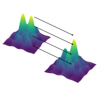Deep Learning of PDEs and Inverse Problems via Optimal Transport
Organization:
Funded by: | UT/EWI |
PhD: | |
Suspervisor: Daily supervisor: | |
Collaboration: | - |
Description:
Inverse problems and PDEs are crucial in many scientific fields. While their classical theories are well-established, they face problems with high numerical complexity and limited expressivity. On the other hand, data-driven approaches offer generalizability but lack interpretability, explainability and theoretical guarantees. We aim to find robust solutions by using optimal transport, combining the strengths of both approaches and bridging the gap between them. We will focus on supervised inverse problems, unsupervised inverse problems, physics-informed learning of dynamics in time-dependent systems (PDEs) and operator learning.
Data-driven methods aim to learn a solution from training data but they often perform poorly on unseen test data. Distributionally Robust Optimization (DRO) finds robust solutions that generalize well to new data. By viewing supervised inverse problems through a Bayesian lens and formulating them as DRO problems, we aim to develop solutions that are robust to perturbations in the measurement process. Specifically, we will examine robustness in terms of the Wasserstein and Sinkhorn distances and evaluate the performance of these solutions. For unsupervised inverse problems, we will implement Wasserstein robustness using a cyclic framework inspired by cycle-GAN approaches and diffusion models.
Additionally, we will use JKO schemes to learn the dynamics of PDEs from data. By incorporating physical priors, our framework will approximate data dynamics, recover conserved quantities, and maintain robustness through the learning process.
Finally, we will theoretically analyze the reconstruction capabilities of the proposed approaches, focusing on the conditions necessary for operator reconstruction and providing error estimates.
Output:
2025
Pictures:




